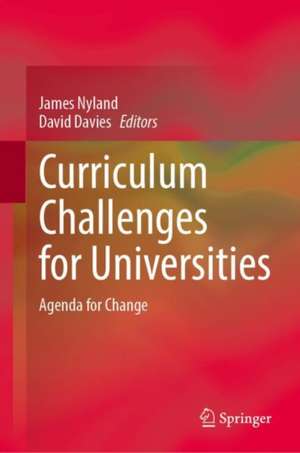Curriculum Challenges for Universities: Agenda for Change
Editat de James Nyland, David Daviesen Limba Engleză Hardback – 2 mar 2022
This book provides critical and analytical insights into the importance of the emergence of mass higher education into public awareness. It explores what is termed ‘contested knowledge’ as part of modern students’ experiences and expectations. By broadcasting some of the future prospects for a democratic university, especially in relation to its communities, it highlights the need to grasp the significance of global change and instability in teaching and learning, and how an adequate curriculum in higher education can be constructed to address the issues that arise.
| Toate formatele și edițiile | Preț | Express |
|---|---|---|
| Paperback (1) | 941.38 lei 6-8 săpt. | |
| Springer Nature Singapore – 3 mar 2023 | 941.38 lei 6-8 săpt. | |
| Hardback (1) | 947.35 lei 6-8 săpt. | |
| Springer Nature Singapore – 2 mar 2022 | 947.35 lei 6-8 săpt. |
Preț: 947.35 lei
Preț vechi: 1155.30 lei
-18% Nou
Puncte Express: 1421
Preț estimativ în valută:
181.28€ • 189.75$ • 150.88£
181.28€ • 189.75$ • 150.88£
Carte tipărită la comandă
Livrare economică 31 martie-14 aprilie
Preluare comenzi: 021 569.72.76
Specificații
ISBN-13: 9789811685811
ISBN-10: 9811685819
Pagini: 197
Ilustrații: XXIX, 197 p. 6 illus., 5 illus. in color.
Dimensiuni: 155 x 235 mm
Greutate: 0.5 kg
Ediția:1st ed. 2022
Editura: Springer Nature Singapore
Colecția Springer
Locul publicării:Singapore, Singapore
ISBN-10: 9811685819
Pagini: 197
Ilustrații: XXIX, 197 p. 6 illus., 5 illus. in color.
Dimensiuni: 155 x 235 mm
Greutate: 0.5 kg
Ediția:1st ed. 2022
Editura: Springer Nature Singapore
Colecția Springer
Locul publicării:Singapore, Singapore
Cuprins
INTRODUCTION AND ACKNOWLEDGEMENTS.- CRITICAL THINKING AND ENGAGEMENT.- 1 Critical thinking for an engaged university.- 2 The university’s social and civic role: time for an appraisal.- 3 The university as a public educator: learning and teaching for engagement.- 4 A crisis of knowledge: themes for an engaged university curriculum.- KNOWLEDGE AND CULTURE.- 5 Freedom through education: a promise postponed.- 6 Dancing in Nazareth: real knowledge beyond the boundary.- 7 A learning curriculum: exploring the professional doctorate of educational practice.- ENGAGEMENT AND DEMOCRACY.- 8 Academic and scholarly freedom: towards a ‘disputing’ university with critically engaged students.- 9 Ways of knowing: towards an ecology of learning and community.- 10 Towards a 21st century approach to civic engagement locally and globally: a conversation between Professor James Nyland and Professor Richard Teare.- THE FUTURE: SLOW BURN OR FAST FORWARD.- 11 The burning world: transformation and sustainabilityor apocalypse?.- 12 Indigenous knowledge in Australia: imagining a different society.- 13 The new normal after coronavirus: is there anyone here from education?.- CONCLUSION.- 14 Learning that matters.
Notă biografică
Professor Jim Nyland is Associate Vice-Chancellor (Queensland) at the Australian Catholic University (ACU), Australia. Prior to this, he held academic appointments at the University of Queensland, Australia, where he was the Director of Corporate Education, and Director of UQ (University of Queensland) Business School Downtown. Previously, Jim was Manager and Principal Advisor in the Vice-Chancellor’s Office for Engagement at Griffith University, Australia, and has held managerial positions in a number of universities in the United Kingdom. He holds a doctorate in Education and has published research covering curriculum change, the nature of learning, and the impact of modernity on educational opportunity. Jim’s work is international in scope, and he has developed education programs in the United Kingdom and Australia, as well as published keynote academic papers in Ireland, Strasbourg and South Africa. He is particularly interested in extending knowledge and capacities in ‘new learning’, both in work and professional settings, and in communities which are in transition and face challenges. He is President of Engagement Australia, Editor of the new Australian journal Transform: Journal of Engaged Scholarship, and represents Australia on the International Consortium for Higher Education, Civic Responsibility and Democracy.
Professor David Davies is Professor Emeritus at the University of Derby, United Kingdom. He has published many works on access, widening participation and equalities over a long period. After researching and teaching in Germany, David worked for the Open University in the United Kingdom and at the universities of Surrey, Cambridge and Derby. He pioneered further and higher education provision, as well as research and the development of new doctoral degrees. He has edited three academic journals and is currently working on university engagement and the significance of literature for social analysis.
Textul de pe ultima copertă
This book develops a progressive program of engagement with issues, problems and critical thinking which helps universities and students understand and engage with some of the key issues of our time. It focuses on curriculum concerns, and presents a sustained and critical analysis and dialogue about knowledge, culture and ways of seeing important issues.
This book provides critical and analytical insights into the importance of the emergence of mass higher education into public awareness. It explores what is termed ‘contested knowledge’ as part of modern students’ experiences and expectations. By broadcasting some of the future prospects for a democratic university, especially in relation to its communities, it highlights the need to grasp the significance of global change and instability in teaching and learning, and how an adequate curriculum in higher education can be constructed to address the issues that arise.
Caracteristici
Explores external issues impacting academic curricula in higher education Examines current knowledge systems in higher education sociologically Presents unique curricular examples of engagement with cultural, social and global issues
